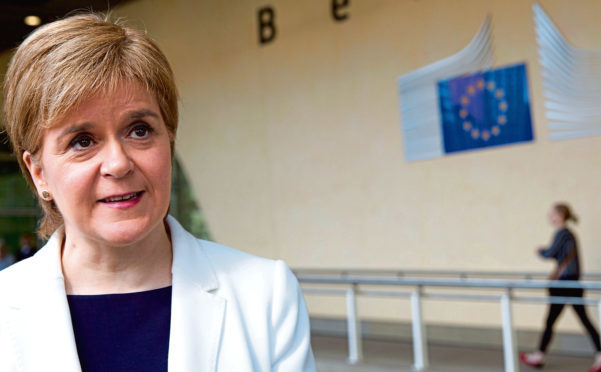Twenty-one years after leaving office, John Major has found a moral urgency that he lacked in Downing Street, commenting this week: “No form of Brexit will remotely match up to the promises made by the Leave campaign in the referendum: they were vote-gathering fantasies, not serious politics.”
Nicola Sturgeon has presented an impressively calm opposition to Brexit. She called this week for a “common sense” compromise. What it hides, though, is a policy that owes a lot more to vote-gathering than to serious politics.
Assuming Brexit goes ahead, the SNP’s waffle about continuous membership of the EU after independence is no longer relevant. The issue they face is how to rejoin at speed and on good terms.
“Sturgeon maintains she can get quick access to the EU without adopting the euro.”
Being in the EU would be highly advantageous to an independent Scotland. The party admits the country would be heavily in the red for the first decade of Indy, and the support of Brussels could a go along way to helping the country transition from debt to stability.
Yet the SNP has three main barriers to making that process easy. The first is the euro.
The modern SNP’s pro-European policy was set by Jim Sillars in the late 1980s with the phrase “Independent in Europe”.
The mood of the 1990s, set by the politics of Bill Clinton in the US and Tony Blair in the UK, was for reasonable compromise in the name of boosting global growth. Being pro-EU just seemed like the sensible thing to be for all but a group of “bastards” (John Major’s word) in the Tory party.
Much as it then seemed sensible to back a single currency. Alex Salmond was in favour of the currency, so was Nicola Sturgeon and the author of the SNP’s Growth Commission, Andrew Wilson.
The SNP’s 2001 UK election manifesto stated: “We see advantages in Scottish membership of the single currency, but this can only be achieved when the economic conditions are correct.”
A classic piece of non-specific, virtue signalling policy – we like it, but not so much as to tie our hands.
The UK Chancellor Gordon Brown had feigned an interest in the currency but set five tests that had to be met before Britain was to join.
Brown didn’t trust the idea, spotting that it would restrict the ability of chancellors and domestic central banks to affect the economy. Salmond’s SNP was shadowing Brown on this.
This view was repeated in the 2003 Holyrood election, “the chance to join the euro when the economic circumstances are right”.
The voters had always been hesitant on the idea, the actual pound in the pocket as much a currency of identity and sentiment as a financial token. This caused a swing away from the euro in British political thinking. By the 2007 election, the euro is not mentioned in the SNP manifesto.
The voters appeared to have called it right when in 2009 the Eurozone crisis crippled European economies. Some countries had run up big debts and the markets were downgrading the value of the euro.
The euro looked toxic and the SNP dropped their support for the currency. Salmond, Sturgeon et all were against the currency. Good for voter appeal, but tricky when it came to explaining how an independent Scotland would manage its economy.
Sturgeon still maintains she can get quick access to the EU without adopting the euro. She’s on a hiding to nothing on that one. Yes, you can argue the toss on Denmark and Sweden rejecting the euro, and yes, there is legal wriggle room, but that line of thought is self-serving sophistry.
Its not the only obstacle the SNP chose to put in the way of a quick EU entry. The 2007 manifesto shows a canny eye on Brexit inclinations – the SNP promises to pull out of the Common Agricultural Policy and the Common Fisheries Policy.
In 2007 the north-east was an SNP stronghold, and the farmers and fishermen had to be humoured.
>> Keep up to date with the latest news with The P&J newsletter
I can’t see these demands standing up to a minute’s scrutiny in Brussels.
The fact is, day one of Scotland’s negotiations to join the EU would begin with a simple check list. Brussels would say – joining the customs Union? Yes. Free travel? Yes. Respect EU laws? Yup. Agree to an annual membership fee? Sure. And join up to all the budget protocols, like the Cap and CFP? No. Really?
What about the euro? You don’t fancy that either.
Strange – for a party and country that has banged on about the merits of Europe, you don’t seem to have grasped the concept. As just demonstrated with Brexit, we aren’t changing the rules for picky Brits.
The SNP’s 2017 manifesto says: “We will set out the process by which our membership of the EU will be secured in the circumstances that prevail at that time.”
That’s a lot better than the Brexiteers winging it, but to imagine after Brexit that Brussels will tolerate Scotland asking for bespoke membership is crazy.
The SNP has had a good Brexit while arguing for a policy which is just as fanciful as the Leave campaign.

